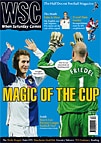 Dave Kitson’s criticism of the FA Cup made headlines, but Roger Titford believes the striker’s comments were misinterpreted and that what needs to change is how the competition’s prize money is handed out
Dave Kitson’s criticism of the FA Cup made headlines, but Roger Titford believes the striker’s comments were misinterpreted and that what needs to change is how the competition’s prize money is handed out
“We’re not going to win the FA Cup. I don’t give two shits about it to be honest,” said Dave Kitson, ahead of Reading’s third-round tie at Spurs. It is a typically blunt opinion that has divided fans both locally and nationally. Those of us with tickets set off leaden-heartedly for the “small” game – but we can’t say we were not warned. It’s been club policy for three years to focus solely on the league. Yet we got a 2-2 draw, where our regulars lost 6-4 the week before.
Kitson is building a reputation for forthright and contrarian points of view. He hates bling and doesn’t even like footballers much. He has turned down overtures from the Republic of Ireland because he doesn’t feel Irish and, indeed, wants to offer his advice on the game to the FA. Finally fully fit after a long struggle with injury, he is currently the leading English scorer in the Premier League and gets mentioned occasionally in connection with the England team. A media offer is likely to beckon.
Kitson’s attitude reflects the single-mindedness about Premier League survival of his manager, Steve Coppell. To be fair, what Kitson went on to say, and which was not widely reported, was: “It’s a fantastic competition. Hopefully one day we’ll be in a position where we can compete for it.” Having first entered the Cup in 1877 (before every current League club bar Notts County), Reading fans have been waiting longer than most. Even back in 1882 the club scratched from a winnable-looking tie only 20 miles away in Marlow that could have led to a quarter-final place: “Only four promises to play had been received.”
Now, 125 years on, the club have never been better resourced but guard those resources ever more jealously. Coppell has a convincing, if ruthless, argument about concentrating on the league and his Cup side has a creditable three-year record of won three, drawn four, lost two, against mainly top-flight opposition. What’s the excuse for weaker sides at more established Bolton, Blackburn and Everton, who all lost at home? What happened to living for the moment? In 2004 Millwall reached the Cup final and played in Europe – two days for fans to remember for ever. Can you put a price on glory? There are some things you can put a price on – such as finishing 15th.
The Premier League prize money for finishing 15th rather than 16th is more than £500,000, even though no one will remember you did so in ten years’ time. The prize money for winning in the third round is just £40,000. The FA Cup prize structure seems to incentivise the wrong people. Rather than have the eventual winners collect £2.4 million as well as all the glory and a place in Europe, why not split the cash among the 16 qualifiers for the fifth round, giving them a minimum of £370,000 each (versus £100,000 currently) plus a good prospect of an equal amount from TV revenues? Premier League and Championship clubs might then be keener to win in the third and fourth rounds to get that prize, and thereafter the scent of Wembley takes over.
Of course, the cost of relegation from the Premier League is a vast consideration. But, although this is usually presented as an either/or argument, over the past five years it is hard to see when a good Cup run has cost a club their Premier League status. In this period, only Watford of the 15 relegated clubs have reached the semi-finals and they were a basket case before the third round.
One suspects there is a very strong generational split in attitudes to the FA Cup between fans who grew up in the “Motty” era (the Chelsea v Leeds replay, Stokoe, Ricky Villa, “Smith must score”, Coventry, Wimbledon) and the post Sky/Premier League era (Big FC v Giant FC, mostly). When once we smuggled transistor radios into school to listen avidly to the third-round draw, many young fans nowadays curse the absence of weekend league fixtures. For them, anything outside the Premier League is a living football death and cannot be risked. For others, Cup glory should still be the passport to footballing immortality of the Stanley Matthews to Ronnie Radford kind. Kitson has made his own kind of mark by pointedly asking who the Cup is now for.
From WSC 252 February 2008